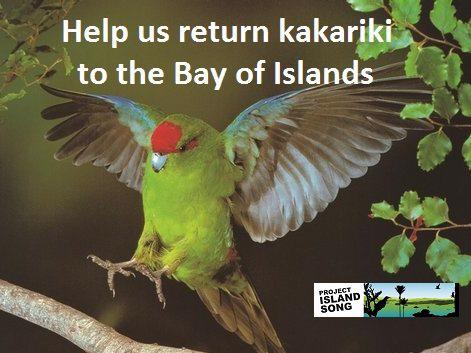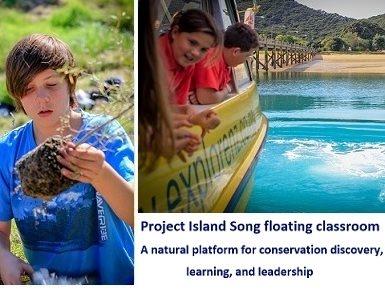We need your help to return the endangered red-crowned kakariki to the Bay of Islands
We need your help to return the endangered red-crowned kakariki/parakeet to the Bay of Islands
Northland
Project Island Song is embarking on its most exciting and ambitious native species translocation since the ecological restoration programme began in 2009. We are now poised to reintroduce kakariki (red-crowned parakeet) to the pest-free Islands of Ipipiri in the eastern Bay of Islands.
Kakariki became extinct in the Bay of Islands many decades ago due to predation by non-native mammal pests. Once common throughout New Zealand, now this threatened endemic parrot species is restricted mainly to pest-free islands. Like tīeke (North Island saddleback), toutouwai (North Island robin) and other the native species already returned to Ipipiri by Project Island Song, the protected pest-free islands now provides a safe-haven for returning this legacy species to the Bay of Islands.
To create a genetically self-sustaining kakariki population in the Bay of Islands, this reintroduction programme is divided into two stages. In June this year up to 40 kakariki will be caught and translocated from Hauturu (Little Barrier) Island to Moturua in Stage One. The requirement for Stage Two and the translocation of a further 40 birds in either 2018 or 19 will be dependent on the outcomes of Stage One.
Kakariki are mobile birds and you will see them flying between the islands and the mainland. Whilst this poses a risk, it is also offers a huge opportunity. In the eastern Bay of Islands hapu, mainland landowners, community groups, and agencies are working together to maintain pest control and are actively progressing towards a mainland ecological island on which kakariki could thrive.
Project Island Song's involvement (page creator)
Project Island Song is a wildlife sanctuary. The seven main islands in the eastern Bay of Islands have been pest mammal free since 2009, and the natural eco-systems are being restored. Thousands of trees have been planted, and five rare and endangered species have been reintroduced. Many more species are planned. In this wild life sanctuary you can discover the home of some of the world’s most fascinating and rare wildlife.
Project Island Song is now embarking on its most exciting and ambitious native species translocation since the ecological restoration programme began in 2009. We are now poised to reintroduce kakariki (red-crowned parakeet) to the pest-free Islands of Ipipiri in the eastern Bay of Islands.
For more information on the native species reintroduction programme please check out: http://www.projectislandsong.co.nz/index.php/the-project/species-reintroductions.html
About us
Project Island Song is the name given to the restoration of the ancient dawn chorus of the Bay of Islands. Project Island Song is an ecological restoration project of an archipelago of island sanctuaries, known as Ipipiri, in the eastern Bay of Islands. After a number of years in operation and achieving significant goals which includes the eradication of pests from the islands, Project Island Song is now in the position to tackle longer term aims, such as the reintroduction of native species to the islands – literally bringing back the birdsong to the islands, note by note.
Other page links
Latest donations





Who's involved?
Our other pages
Page Q&A
Ask a question hereAny concerns?
Report this pageThank the donor
Your message will be displayed on the page and emailed to the donor.
Your new message will also be emailed to the donor.
Saving a blank entry will delete the current comment.



